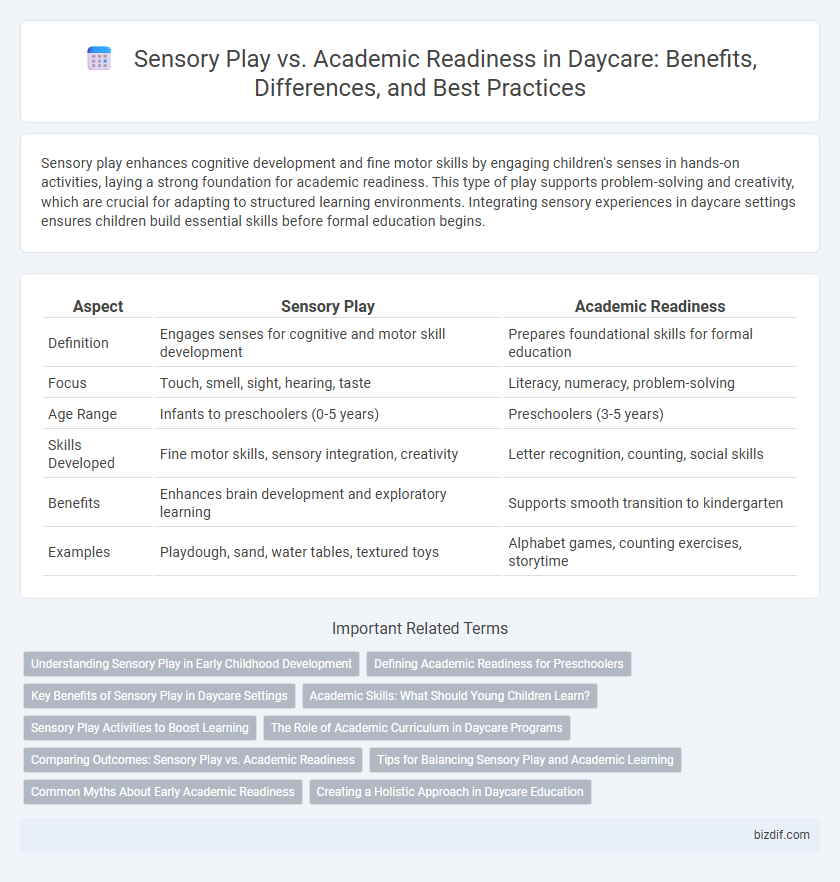Sensory play enhances cognitive development and fine motor skills by engaging children's senses in hands-on activities, laying a strong foundation for academic readiness. This type of play supports problem-solving and creativity, which are crucial for adapting to structured learning environments. Integrating sensory experiences in daycare settings ensures children build essential skills before formal education begins.
Table of Comparison
| Aspect | Sensory Play | Academic Readiness |
|---|---|---|
| Definition | Engages senses for cognitive and motor skill development | Prepares foundational skills for formal education |
| Focus | Touch, smell, sight, hearing, taste | Literacy, numeracy, problem-solving |
| Age Range | Infants to preschoolers (0-5 years) | Preschoolers (3-5 years) |
| Skills Developed | Fine motor skills, sensory integration, creativity | Letter recognition, counting, social skills |
| Benefits | Enhances brain development and exploratory learning | Supports smooth transition to kindergarten |
| Examples | Playdough, sand, water tables, textured toys | Alphabet games, counting exercises, storytime |
Understanding Sensory Play in Early Childhood Development
Sensory play stimulates a child's brain through hands-on activities involving touch, sound, smell, taste, and movement, which builds neural pathways essential for cognitive growth and academic readiness. Research in early childhood development shows that sensory experiences enhance fine motor skills, language acquisition, and problem-solving abilities, directly supporting later success in structured learning environments. Incorporating sensory play in daycare settings fosters foundational skills that promote attention, self-regulation, and engagement critical for academic achievement.
Defining Academic Readiness for Preschoolers
Academic readiness for preschoolers involves the development of foundational skills such as language, cognitive abilities, and social-emotional growth, preparing children for the structured learning environment of kindergarten. Sensory play supports academic readiness by enhancing fine motor skills, attention span, and conceptual understanding through hands-on exploration. Emphasizing sensory experiences promotes brain development and readiness to engage with academic tasks like reading, writing, and problem-solving.
Key Benefits of Sensory Play in Daycare Settings
Sensory play in daycare settings enhances cognitive development by stimulating neural pathways associated with problem-solving and language skills. Engaging multiple senses through tactile, auditory, and visual experiences fosters emotional regulation and social interaction, laying a strong foundation for academic readiness. This hands-on exploration improves fine motor skills and attention span, crucial for successful learning in early education environments.
Academic Skills: What Should Young Children Learn?
Academic readiness in young children focuses on foundational skills such as letter recognition, basic counting, and early problem-solving abilities. Sensory play supports cognitive development by enhancing fine motor skills, attention span, and language acquisition, which are crucial for academic learning. Integrating sensory experiences with structured academic activities promotes balanced development in early childhood education settings.
Sensory Play Activities to Boost Learning
Sensory play activities such as water tables, sandboxes, and tactile art projects enhance neural connections critical for cognitive development and academic readiness. Engaging multiple senses through textured materials and movement-based tasks improves attention, memory retention, and problem-solving skills in early learners. Incorporating sensory-rich environments in daycare settings supports foundational learning by fostering curiosity and critical thinking abilities.
The Role of Academic Curriculum in Daycare Programs
Academic curriculum in daycare programs plays a crucial role in fostering early cognitive development by introducing foundational concepts such as numbers, letters, and problem-solving skills. Structured learning activities enhance academic readiness while integrating sensory play elements, which support neural connections and fine motor skills essential for effective learning. Balancing academic instruction with sensory engagement ensures children develop critical thinking and sensory processing abilities, promoting well-rounded growth in early childhood education.
Comparing Outcomes: Sensory Play vs. Academic Readiness
Sensory play enhances cognitive development by stimulating the brain's neural pathways, improving fine motor skills, and fostering creativity, which are crucial for early learning. Academic readiness programs emphasize foundational skills such as literacy, numeracy, and structured problem-solving, preparing children for formal education settings. Research shows children engaging in sensory play exhibit better attention spans and social-emotional skills, while those in readiness programs demonstrate stronger early academic performance; a balanced approach integrating both yields optimal developmental outcomes.
Tips for Balancing Sensory Play and Academic Learning
Incorporate sensory play activities such as tactile bins and water tables alongside structured academic tasks to enhance cognitive development and maintain engagement. Establish a routine that alternates between hands-on exploration and focused learning sessions, allowing children to process information through multiple modalities. Use age-appropriate sensory materials that support fine motor skills and early literacy to create a seamless integration of play and academic readiness.
Common Myths About Early Academic Readiness
Common myths about early academic readiness in daycare include the belief that sensory play delays cognitive development or distracts from learning core academic skills. Research shows sensory play enhances brain development by improving motor skills, language, and problem-solving abilities, making it a crucial foundation for academic success. Prioritizing sensory activities supports holistic growth, challenging the misconception that early education should focus solely on formal academics.
Creating a Holistic Approach in Daycare Education
Sensory play enhances cognitive development by stimulating neural pathways crucial for academic readiness in daycare settings. Integrating sensory activities with foundational literacy and numeracy skills fosters a holistic approach that supports emotional, social, and intellectual growth. This balanced strategy prepares children for classroom challenges while nurturing creativity and critical thinking from an early age.
Sensory play vs Academic readiness Infographic

 bizdif.com
bizdif.com